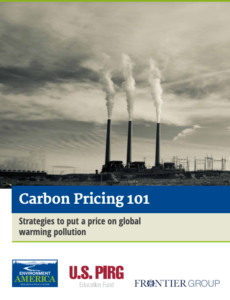Full Title: Carbon Pricing 101: Strategies to put a price on global warming pollution
Author(s): J. David Lippeatt, Andrea McGimsey, Matt Casale
Publisher(s): U.S. PIRG, Environment America, Frontier Group
Publication Date: April 20, 2021
Full Text: Download Resource
Description (excerpt):
Global warming is the existential challenge of our time, threatening lives, livelihoods and the future of the planet. Wildfires, extreme storms and other impacts of global warming are already causing devastation around the world. Those impacts will only become more dramatic over time unless we move to cut greenhouse gas (GHG) emissions immediately and dramatically.
To prevent the worst impacts of global warming, the United States must achieve carbon neutrality by 2050. The Intergovernmental Panel on Climate Change (IPCC) warns that world carbon emissions must reach net zero around 2050 to limit global warming to 1.5°C over preindustrial levels – the level beyond which catastrophic climate changes could occur.[i]
U.S. policymakers must use every practical policy tool to make this zero-carbon transformation a reality – promoting rapid deployment of renewable energy sources, investing in research and development of clean energy technologies and energy efficiency and taking regulatory actions to push polluters away from using dirty fossil fuels. Policymakers must act decisively, which will require securing bipartisan support.
A central element in this strategy should be putting a price on carbon pollution (known as carbon pricing) to push polluters to cut emissions and switch to clean energy. Pricing carbon pollution makes polluters pay for the damage they cause and incentivizes them to use energy more efficiently and shift from oil, coal and natural gas to clean, renewable energy.
